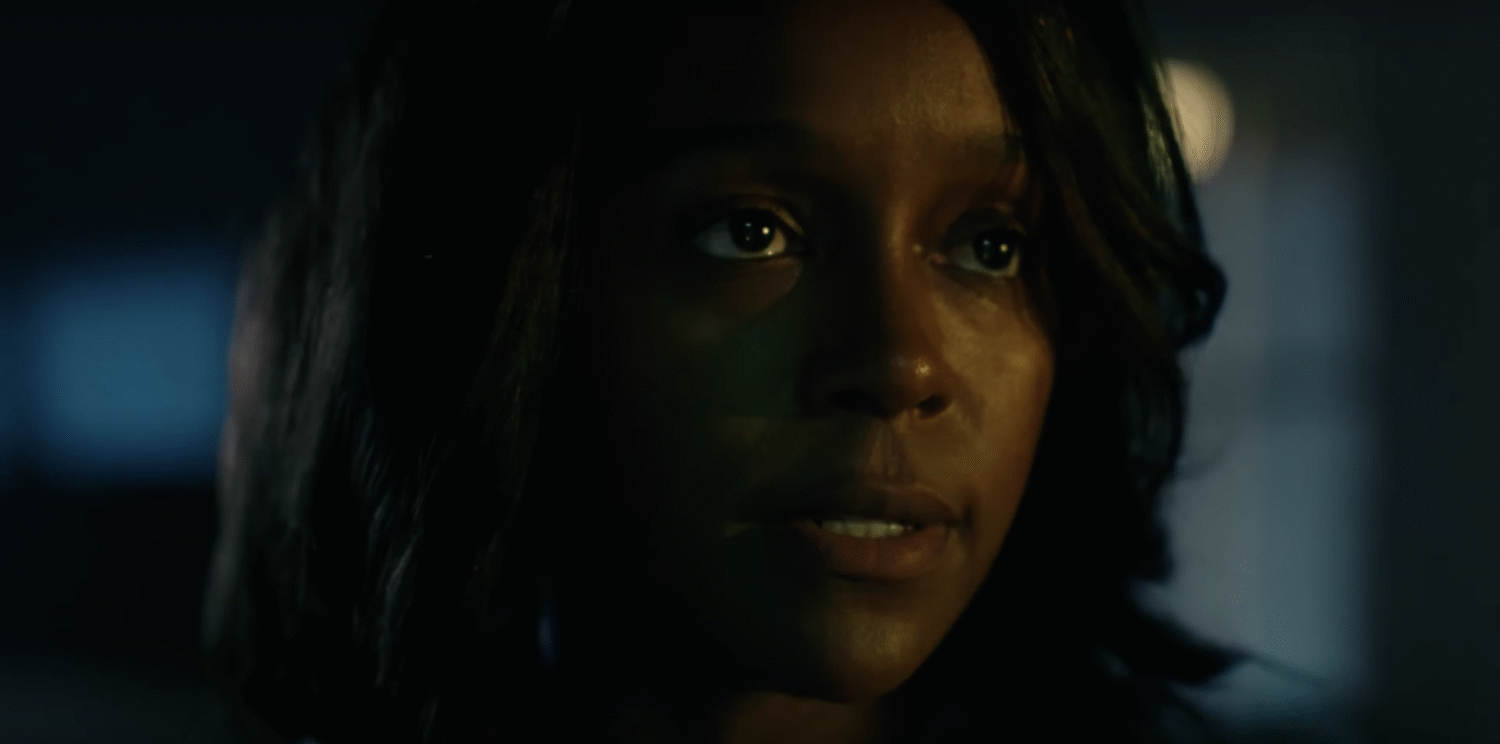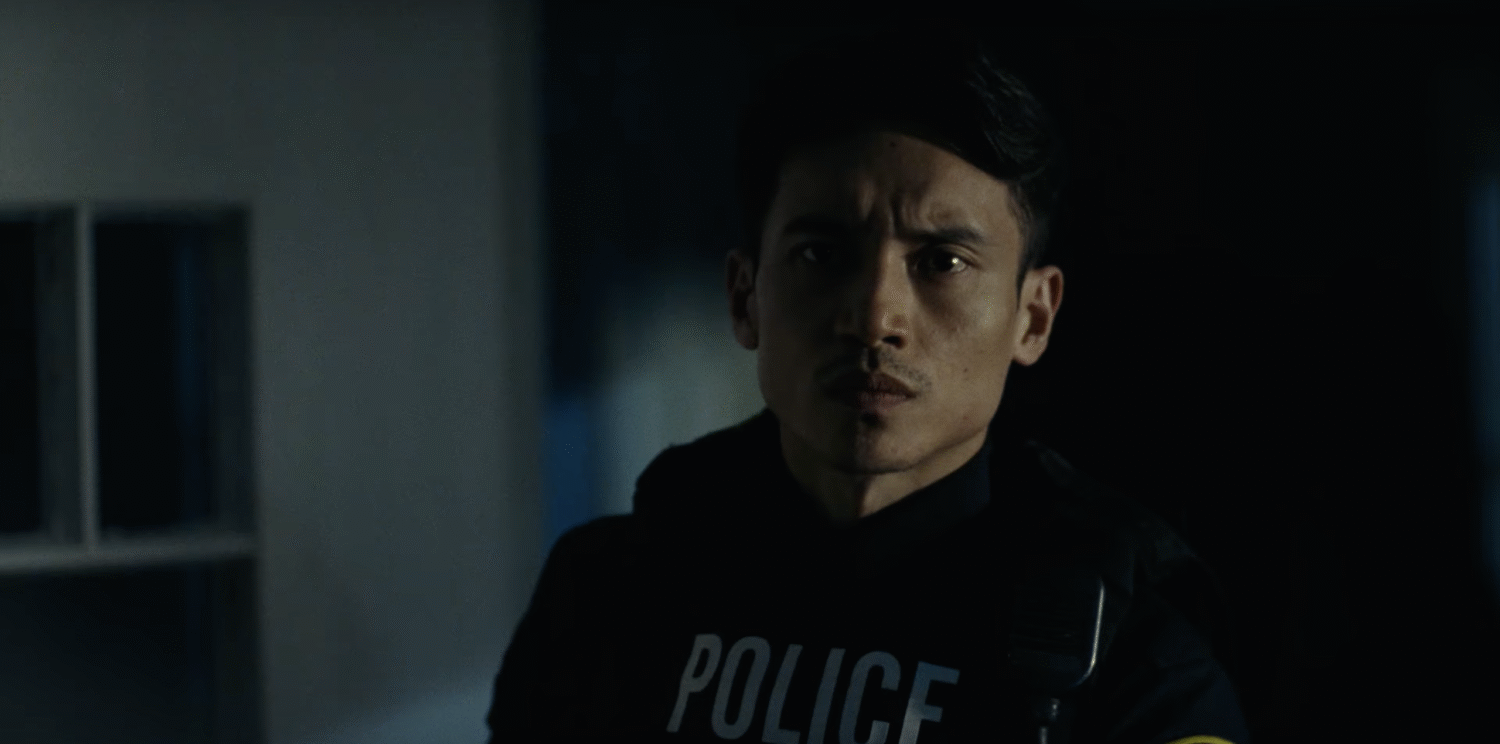The Knife Review and Ending Explained
Nnamdi Asomugha’s The Knife might clock in at just 74 minutes (80+ minutes for the Tribeca Film Festival), but it’s already sparked more heated post-screening conversations than films twice its length. It’s messy, tense, occasionally frustrating, but it’s also the kind of directorial debut that makes you lean forward, argue with your friends afterward, and wonder: what would you have done?
Story Recap, Synopsis and Review
So, here’s the setup: Chris (played by Asomugha himself), his wife Alexandra (Aja Naomi King), and their three kids are asleep in their picture-perfect suburban home when Chris hears a noise in the middle of the night.

He goes downstairs, and there’s this eerie, almost Twin Peaks-like moment: a disheveled white woman is just standing in their kitchen, silent, almost catatonic. He tries to talk to her—nothing. She suddenly turns, there’s a blackout cut, and next thing we know she’s lying unconscious on the floor.
Already, the ambiguity kicks in:
Did Chris hurt her?
Did she fall?
Was it an accident?
Chris himself doesn’t know—he panics, stammers, claims he “blacked out.” And just like that, the foundation of mistrust is laid.
The wife enters, the kids peek in, the baby starts crying. Before the cops even arrive, Alexandra does something that makes half the audience groan in unison: she grabs a kitchen knife that belongs to Chris and places it in the stranger’s hand. Boom. Now this isn’t just “a random intruder collapsed in our home,” it’s “maybe there was a knife fight.”
Here’s the thing: if you’ve watched even one episode of Dateline, you know that’s the absolute worst move possible. And it’s here where The Knife shifts gears. It’s no longer about the intruder—it’s about the family, their secrets, and how fear of perception (especially as a Black family in America) can push people to self-destruct.

Enter Detective Carlsen (Melissa Leo, scene-stealer supreme), who treats the whole thing as a crime scene from the get-go. She separates the family, questions each member, and the cracks show fast:
- Chris is visibly anxious, fumbling pills from an unmarked bottle, smelling of alcohol.
- Alexandra is evasive, suspiciously nervous.
- The kids reveal little things—Dad drinks when he’s not supposed to, Mom tells them to “just say it was self-defense.”
The tension escalates because we, the audience, are put in the detective’s shoes. Every time we think, well, that sounds innocent enough, another detail complicates it.
Did Chris actually stab this woman?
Why won’t he just say what happened?
Why did Alexandra tamper with the scene?
Why do the kids look more honest than the parents?
This isn’t just a thriller—it’s a study in how fear warps behavior.
If you’ve seen Carey Williams’ Emergency (2022), you’ll remember a similar setup: Black men confronted with an unconscious white girl in their presence, panicking not because they’re guilty, but because they know how it looks.
The Knife plays in that same sandbox, but with a family unit, making it even more claustrophobic.
And while some critics argue the script is too thin for all this (and they’re not wrong—the escalation sometimes feels forced), there’s something deeply compelling about how paranoia and self-preservation create their own reality.
Ending Explained
Alright, here’s where it gets juicy.
As the night spirals, Carlsen drops the bomb: the knife that was found in the woman’s hand actually belongs to Chris. “The knife is coming from inside the house,” essentially. That’s tampering with evidence—felony territory. Cops draw guns, tensions peak, and Chris is arrested.
In the patrol car, as the family watches helplessly, we hear radio chatter suggesting even darker possibilities: maybe Chris assaulted the woman, maybe he’s dealing drugs (those unmarked meds look suspicious), maybe this wasn’t a break-in at all.
By the credits, the narrative has flipped completely: Chris, a man who woke up to protect his family, is now branded as the aggressor.
And then there’s that voiceover bookend: Chris recalling his grandmother’s words about choices, consequences, and the messes we leave for our loved ones.
The film wants us to sit with that irony: the biggest consequence wasn’t the intruder—it was how they responded.
So what does it mean?
- The Ambiguity Is the Point
We never really know what happened in that kitchen. Did Chris accidentally hurt the woman? Did she collapse on her own? The blackout cut ensures we’ll never have clarity. And that’s deliberate—it’s less about the event than about the reactions it provokes. Ambiguity is a weapon here, forcing us to interrogate our own assumptions, especially about race, power, and guilt. - Fear of Perception = Self-Sabotage
Alexandra planting the knife is the ultimate act of fear. She doesn’t know what happened, but she assumes the worst: a Black man versus a white woman = disaster. Her attempt to “fix” the optics only damns them further. It’s a tragic irony—trying to protect her husband ensures his downfall. - A Critique of Policing… But Also of Internalized Policing
Yes, the white officers are depicted as quick to assume guilt. But the more radical reading is that the family polices themselves first. Chris clams up, Alexandra lies, the kids are told to “say the right thing.” Their actions are built on an expectation of injustice so strong it becomes a self-fulfilling prophecy.
Think about it: if they had simply told the truth—strange woman entered, father blacked out, she’s still breathing—the worst they’d face is a confusing night at the station. Instead, their panic produces lies, inconsistencies, and enough suspicion for the system to chew them up.
- Comparisons That Matter
- A Lot of Nothing (2022, dir. Mo McRae): another film about a Black couple making terrible decisions under pressure, escalating a manageable situation into tragedy.
- Rashomon (1950, Kurosawa): critics have suggested a Rashomon-style retelling could’ve elevated The Knife—multiple perspectives, clashing truths, no clear resolution. Imagine if each family member’s version contradicted the others? That might have made the ambiguity more purposeful.
- Get Out (2017, Peele): while Peele’s film uses horror satire to tackle race and power, The Knife tries for realism. Where Peele exaggerates to clarify, Asomugha strips down to raw unease.
- A Lot of Nothing (2022, dir. Mo McRae): another film about a Black couple making terrible decisions under pressure, escalating a manageable situation into tragedy.
- The Ending as a Mirror
The film ends not with resolution but with projection. We never hear the intruder’s account. We never get courtroom closure. Instead, the final image—Chris being driven away—forces us to wrestle with our own verdict. Is he innocent? Is he guilty? Does it even matter, if the system has already decided?
And that’s why, frustrating as it feels, the ending is potent. It’s not about “solving the case.” It’s about revealing the case was never solvable in the first place, because the real conflict isn’t in the kitchen—it’s in the weight of history, perception, and fear.
Final Thoughts
The Knife isn’t perfect.
Some of the dialogue feels clunky, some of the escalation contrived.
But as a debut, it’s gutsy. Asomugha crafts a chamber piece that forces us to think about how stories are constructed—not just in film, but in life, in courtrooms, in police reports, in media headlines.
For cinephiles, it’s fascinating because it’s both cinematically economical (74 minutes, one main location, tight cast) and thematically sprawling (race, class, policing, family secrets, morality).
That tension between the small and the massive is exactly why it’s worth arguing about.
And honestly?
I think that’s the best compliment you can give a debut: it leaves you arguing, replaying choices, asking, What if they’d just told the truth? or What would I have done?
Because at the end of the day, The Knife isn’t about Chris, Alexandra, or the woman on the floor.
It’s about us—how we process ambiguity, how we judge others, and how sometimes the real knife is the fear we carry.






